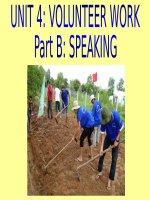unit 4 unit 4 volunteer work part 1 phonetics exercise 1 choose one word whose underlined part is pronounced differently identify your answer by circling the corresponding letter a b c or d 1 a char
Bạn đang xem bản rút gọn của tài liệu. Xem và tải ngay bản đầy đủ của tài liệu tại đây (31.92 KB, 5 trang )
<span class='text_page_counter'>(1)</span><div class='page_container' data-page=1>
<b>Unit 4</b>
VOLUNTEER WORK
<b>Part 1. PHONETICS:</b>
<b>Exercise 1: Choose one word whose underlined part is pronounced </b>
<b>differently. Identify your answer by circling the corresponding letter A, B, C or </b>
<b>D:</b>
1. A. charity B. gratitude C. craft
D. attitude
2. A. donation B. remote C. cosy
D. minority
3. A. residential B. refreshment C. remote
D. remember
4. A. issue B. minority C. childish
D. brighten
5. A. clear B. near C. bear
D. hear
<b>Exercise 2: Choose one word whose stress pattern is different. Identify your </b>
<b>answer by circling the corresponding letter A, B, C or D:</b>
<b>6. A. remote</b> B. hostess C. sneaky
D. floppy
7. A. issue B. martyr C. cosy
D. affect
8. A. minority B. refreshment C. constancy
D. enthusiasm
9. A. brighten B. loyalty C. donation
D. wounded
10. A. gratitude B. acquaintance C. apartment
D. appreciate
<b>Part 2. VOCABULARY AND STRUCTURE</b>
<b>Choose from the four given options marked A, B, C and D one best answer</b>
<b>to complete each sentence by circling the correcponding letter A, B, C or D:</b>
11. Do many people in your country---take care of others?
A. voluntarily B. volunteer C. voluntary
D. volunteerism
12.---do the volunteers often do?
A. What B. Which C. When
D. Why
13. Do volunteers often spend time---other people in hospitals,
orphanages or homes for
</div>
<span class='text_page_counter'>(2)</span><div class='page_container' data-page=2>
A. help B. helping C. to help
D. helped
14. Do you volunteers in your country go and work---the homes of
sick or old people?
A. for B. at C. on
D. in
15.---young volunteers do the work, such as: cleaning up the house,
doing the shopping and
cooking meal for the sick and old people?
A. Does B. Do C. Did
D. To do
16. In my country, young university and college volunteers
often---in helpoften---ing the people
who have special circumstances.
A. participating B. participated C. participate
D. to participate
17.---summer vacations, the students voluntarily go and work in
remote or mountainous
areas to provide education for children.
A. At B. Of C. By
D. During
18. Do you think that if youbring---to others, you are also a happy
person?
A. happy B. happiness C. happily
D. happiest
19.What kind of volunteer work---you participating in?
A. do B. are C. have
D. can
20. We are---the poor people in the remote areas.
A. help B. to help C. helped
D. helping
21.---exactly are you doing?
A. Which B. When C. What
D. Who
22. We---helping the poor people to mow the lawns, repair the
roofs of their house, teach
their children how to read and write in the evenings.
A. is B. are C. be
D. to be
</div>
<span class='text_page_counter'>(3)</span><div class='page_container' data-page=3>
A. to get B. to overcome C. to know
D. to pass
24.---do many people do volunteer work?
A. What B. Why C. Which
D. Who
25. Do you---volunteer work?
A. enjoy B. enjoys C. enjoying
D. enjoyed
26. Have you ever---part in volunteer work?
A. take B. took C. taken
D. to take
27. How---times have you taken part in volunteer work?
A. much B. many C. long
D. often
28. This is informal school. It---classes to disadvantaged children
in my town.
A. provides B. provide C. providing
D. provided
29. About 150 children with special difficulties---attend classes.
A. regular B. usual C. frequency
D. regularly
30. Children in these classes often take part---fundraising
performances.
A. on B. at C. in
D. of
31. They raisemoney---their study and expand their school
activities.
A. to continue B. continue C. continuing
D. continued
32. Volunteers are---to help organise the great events.
A. require B. requiring C. required
D. to require
33. Which kind of volunteer work do you---? Helping the poor or
helping the sick?
A. require B. requiring C. required
D. to require
34. Have you---supported charities?
A. always B. sometimes C. usually
D. ever
</div>
<span class='text_page_counter'>(4)</span><div class='page_container' data-page=4>
A. raise B. to raise C. raising
D. raised
36. Do you think that the best way of raising money to support
charities---through fundraising activities?
A. is B. are C. was
D. were
37. She is looking forward to---you again.
A. meet B. meeting C. met
D. be met
38.---photographs of the place, I had no desire to go there.
A. Have seen B. Had seen C. Having seen
D. To have seen
39.---the museum, we decided to have lunch in the park.
A. Visited B. Having visited C. Have visited
D. Visiting
40.---the story before, she didn’t want to hear the story again.
A. Heard B. To hear C. Having heard
D. Hearing
41. You cant prevent him from---alcohol.
A. drink B. to drink C. drinking
D. drank
42. In spite of---extremely tired, I went to school.
A. to be B. be C. being
D. am
43. He got good marks at his exams because he spent almost his
time---his lessons.
A. revise B. revising C. to revise
D. to be revised
44. I saw her---the staff room.
A. to enter B. enter C. entering
D. entered
45. Would you mind---the window?
A. open B. opening C. to open
D. opened
46.---all his money, he decided to go home and ask his father
for a job.
A. Having spent B. Spent C. Spending
D. Have spent
47. We saw the first star---in the sky.
</div>
<span class='text_page_counter'>(5)</span><div class='page_container' data-page=5>
48. Its no good---to him, he never answers letters.
A, write B. being written C. writing
D. to wirte
49. Ask him to come in. Don’t keep him---at the door.
A. to stand B. standing C. stand
D. being stood
50.---the money, they began quarrelling about how to divide it.
A. Have found B. Found C. Having found
D. Finding
</div>
<!--links-->









